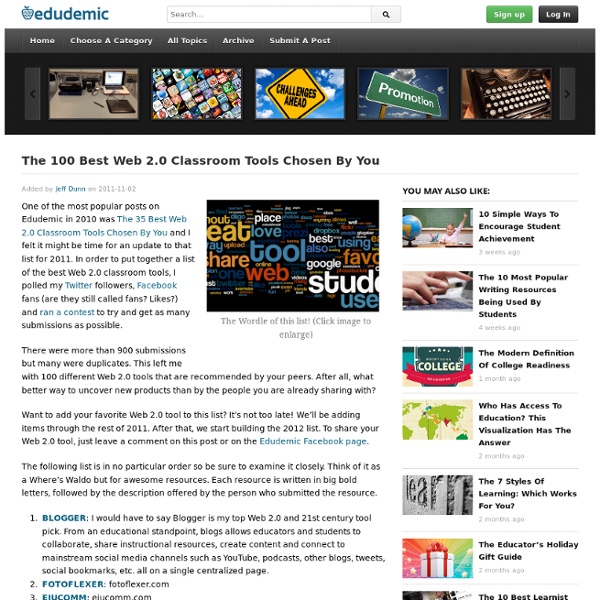Google for Educators - Resources for using Google in school
I am a huge proponent and user of Google tools, both for myself and in my classroom. Here are some great resources for educators who want to learn more about using Google's many tools in their classroom. Last week, Kathy Schrock posted a great interactive image of Google tools listed by Bloom's taxonomy levels. It is a great way to search for Google tools as you work to create activities for your students.
35 Best Websites for Free Educational Videos
What are the best websites to watch educational videos? Here are over 35 websites to watch thousands of educational videos covering business, science, health, technology, math, social studies, arts and more. Please bookmark this page or share it if you find this article useful. 1. 5min Offers short, practical how to videos, instructional videos and DIY solutions. 2.
50 Incredibly Useful Links For Learning & Teaching The English Language -
Teaching a new language to non-native speakers may be one of the most challenging educational jobs out there, so ELL teachers can use all of the help they can get! Thankfully, many excellent resources for ELL and ESL exist online, from full-service websites to reference tools and communities, all designed to make the task of educating ELL students just a little bit easier and more effective. We’ve scoured the Internet to share 50 of the best of these resources, and we hope you’ll find lots of valuable content and tools through these incredibly useful links for ELL educators. Websites
ESL Classroom Spin Wheel Game Prepositions Game
ESL Interactive Fun Games Here we have the games carefully laid out for you. Follow the links to browse the variety of games offered.
15 classroom language games
Using English and avoiding L1 for instruction language and common questions in the classroom is absolutely vital if you want students to use English every day and realise that what you are teaching them is relevant to their lives. Below are 15 games to practise this kind of useful language. NB: if you want to […] Using English and avoiding L1 for instruction language and common questions in the classroom is absolutely vital if you want students to use English every day and realise that what you are teaching them is relevant to their lives. Below are 15 games to practise this kind of useful language. NB: if you want to add spoken production of the classroom language to any of the action games below, you can have the students chant the actions they are doing as they do them and/ or allow students to take turns giving each other instructions
51 Things every game student should know
100 things every game student should know (.pdf download) With another round of assessments and marking finished and all the comments from well wishers, Grammar Nazis and the much better informed, I can now unleash the promised “100 Things” version of my pdf. Some notable corrections include caveats about the whole “mobs” debacle, “vertexes” being Kosher after all, a response from Notch (NOTCH!!!), as well as lots of great additions inspired by and coming directly from comments on this blog and via my twitter feed. There’s a thanks page at the end.
Top 40 Useful Sites To Learn New Skills
The web is a powerful resource that can easily help you learn new skills. You just have to know where to look. Sure, you can use Google, Yahoo, or Bing to search for sites where you can learn new skills , but I figured I’d save you some time. Here are the top 40 sites I have personally used over the last few years when I want to learn something new.
27 Simple Ways To Check For Understanding
27 Simple Ways To Check For Understanding Checking for understanding is the foundation of teaching. Whether you’re using formative assessment for data to personalize learning within a unit, or more summative data to refine a curriculum map, the ability to quickly and easily check for understanding is a critical part of what you do. (Which was the idea behind our post last March, “10 Assessments You Can Perform In 90 Seconds Or Less.”) The following infographic Mia MacMeekin offers up 27 additional ways to check for understanding. Some aren’t necessarily quick–“Test what you learned in a new situation”–but there are a dozen or more other ideas that are worth adding to your teacher toolbox, many of which aren’t content-related, but rather cognitively-related (Locate 3 people who agree with your point of view.)



